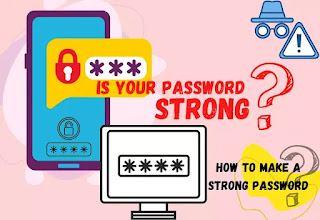Wondering-
How to make a strong password for logins? How to make a password which you can remember? How to make a safe and secure password for email, Instagram, Twitter, and Facebook?
We asked 45 people on LinkedIn and 26 of them said their email address had a password of fewer than 5 characters. 31 of them said it was something related to their name and date of birth.
According to a research by GoodFirm-
30% of surveyees reported password leaks and security breaches owing to poor password practices and weak password setups.
Key Takeaways from the Research:
- 62.9% of online users change their passwords only when prompted
- 45.7% of users keep the same password for multiple sites/applications
- 52.9% of surveyees have shared their login and password credentials with colleagues, family members, and friends
- 35.7% of the people still use paper, sticky notes, or planners to write down their passwords
- 30% of online users have been victims of security breaches caused by weak passwords
- 88.6% of respondents use two-factor authentication
As per Google, 24% have used the word “password,” “Qwerty” or “123456” as their account password, while only 34% change their passwords frequently.
Are you one of them? Well, if you are it's time for a change! It's time to be secure.
➤ How to make a strong password for Instagram, Twitter, and email?
Password Length and diversity are what make a strong password.
A strong password has-
- At least 10 characters. 16+ characters are considered very strong.
- capital letters and small letters mixed up.
- numbers jumbled in between the letters.
- some special symbols like ()=[]-<>_%{}|:,^#*;!?+/&@ within the letters.
➤ What you should not do while keeping a password?
- Avoid characters that look similar. For e.g. O and 0; l, I and 1. These characters will confuse you a lot.
- Avoid series/sequential letters or numbers in your passwords like 12345, qwerty, pqrst, 6789, abcdef, 100000, etc.
- Do not use your personal information like name, nickname, address, institution name and date of birth in your passwords.
- Avoid repetition of characters in case the password if it has no meaning. This way your password will be more memorizable.
- Try to use a combination/phrase which has meaning or is at least pronounceable. It will help you remember it in the future.
➤ How should you maintain the password?
- Don't use the same password for every login. Yes, it is a tough hassle to maintain so many passwords, but it's needed. Password managers can be of great help for this reason.
- Don't share your passwords with anyone.
- Use a secured space to store your password. You should keep store them somewhere so that you can see them even when you are out of your home.
- If you use someone else's laptop/desktop to log in to your account always do that as a guest.
- Change your once every two months.
Check how strong is your password...
Some very BIG and Highly STRONG password examples
#staY=[HAPPY]&[HEALTHY]*4ever*!
@keep*SMILING*4ever!!
#single_LIFE99%sad_LIFE_!
@[youARE86%TIMEawesome]!
#Iwant2marry@HUMAN_BEING!
Some BIG and STRONG password examples
#Ineed=COFFEE; @Welcome2ourHOME!
*Iwant2FLYhigh!* @Practice100%Hard!
#wordHARD2day! #I*love*Twitter100%
#i_LOVE_cats&dogs; #Pinterest@Life!FUN
@IamSOmuchHUNGRY! #May_IcomeINplease?
Remember
Every login is a chance for a cybercriminal to hack into the company network and steal data from it.



You can count me as one among them who uses less than 10 characters 🤣
ReplyDeleteMe too🤣
Delete🤘👍
Delete